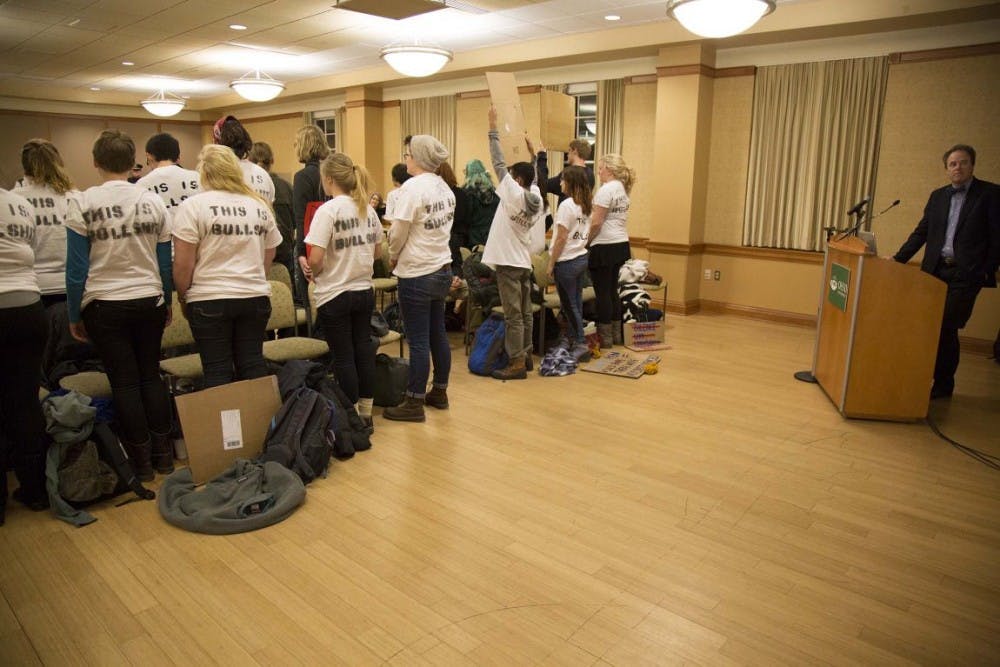Students sit in on, protest lecture that takes a different stance on rape culture on college campuses.
Painted signs and student protesters guarded the front rows of a conference room in Baker Center 30 minutes before author KC Johnson spoke to Ohio University students Monday.
Johnson’s speech, sponsored by the George Washington Forum on American Ideas, Politics and Institutions, focused on procedures regarding sexual assault cases on campuses in the United States.
“If we were all to return to this room seven to eight years from now, there would be a reconsideration of these issues, there would be a tilt back in favor of due process,” said Johnson, an American History professor at Brooklyn College and City University of New York Graduate Center.
“Judges in the end like due process,” Johnson said. “It is kind of their jobs.”
The speech entitled “Abandoning Due Process: Campus Sexual Assault and Presumptions of Guilt” drew criticism from F--kRapeCulture, which accused Johnson on social media of blaming sexual assault victims. About 50 people attended.
Before Johnson began his presentation, protesters unanimously stood up, faced the crowd, and bared white-colored shirts that read “Rape is Real.”
When they were asked to sit back down, the shirts revealed another slogan on the back: “This is bullsh--.”
Johnson was skeptical of defining rape culture for universities nationwide.
“One of the reasons why I think procedure is so important is that most cases of sexual assault are not clear-cut.”
His critics were not limited to student activists.
“I’m a lawyer, and I’m all for due process, and I’m all for justice, but justice cuts both ways — for the accused and the victim,” said Thomas Costello, a visiting professor in the School of Communication Studies. “I think he failed to address the underlying culture that leads up to sexual assault and sexual violence.”
There were others in attendance of the event that supported Johnson’s discussion.
“I have a lot of doubts that rape culture exists,” said Anne Huddleston, a doctoral student in the OU History department. “We hear, I think, a lot from the other side and almost nothing, ever, from speakers who would be deemed politically incorrect or perceived as hostile in any way. There’s a lot of hostility that exists between those two paradigms, and I think that’s a tragedy.”
Johnson, the co-author of, “Until Proven Innocent: Political Correctness and the Shameful Injustices in the Duke Lacrosse Rape Case,” said studying sexual assault cases on American campuses were not his original area of expertise.
“I’m by training a historian. This is not an issue I had spent really any time working on until I got involved in the Duke case,” Johnson said. “My approach tends to be more procedure-oriented and trying to avoid some of the very explosive questions that seem to me to sort of yield more heat than light. I think the best thing that I’ve done on this issue is simply to describe what the college procedures actually are.”
Sexual assault has been a widely discussed topic on OU’s campus, particularly in the past year.
OU’s Survivor Advocacy Program is funded on grant money set to expire in Oct. 2015.
The uncertainty in funding sparked protests at the Board of Trustees meeting this past January.
Shari Clarke, vice provost for Diversity and Inclusion, has expressed OUSAP remains a “high priority” for the university’s budget proposal, which will be finalized later this spring.
@bnbjourno
bb308113@ohio.edu






